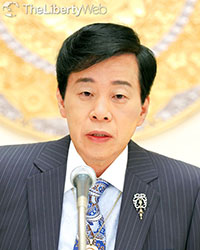Religious Obedience and Brainwashing: What’s the Difference? Part 3
World Teacher’s Message No. 307
People outside of Japan grow up being taught that the growth of the “self” is good, and as such, when I tell them about the necessity of obedience and submissiveness with respect to faith, they often interpret it as religious brainwashing. Please tell us about the difference between submissiveness of faith and a cult, as well as the attitude that believers should take.
From the lecture “My Views, My Ways of Thinking”
August 27, 2017 Happy Science Special Lecture Hall

Previously, I pointed out that in religion it is important to protect the unwavering spiritual values that lie within it. I also stated the importance of being tolerant to diverse cultures, and the fact that religious submissiveness does not always align with God’s teachings if self-interest of religious leaders get in the way.
From the perspective of God, God may think, “Both religions have been created under the guidance of the same God at different times, so acknowledge your differences and get along a little more.” In the meantime, humans are screaming “Kill the enemies of God!” and fighting each other on Earth. Even if the leaders are the ones ordering them to act this way, being submissive or following the rules verbatim is not always right.
When I watch American exorcist films, I often find that the demons originate from old religious idols, found not from burial mounds, but from excavated tombs in Iran or Iraq. I get the impression that it is easy for people to view other religions this way.
In reality, when I look at new religions in Japan, there are lots of religions that I think are wrong, so there are aspects that cannot be helped. However, I think people must also accept to some extent that even if a religion had the right teachings of God, if they were created at different times in different regions by different ethnicities, then the teachings may differ to an extent.
So, I must say that it is okay to be obedient, but if you are forced to be like that in a human sense and, I don’t know if I should call it brainwashing, but if you are surely made to think a certain way, then I think “tolerance” is another value that must be kept.
Allowing Missionary Freedom Is Essential
However, there are people who are a little more open-minded. Jakucho Setouchi, a monk of the Tendai sect, once said something after the Aum Shinrikyo incident (*1) when people were saying that brainwashing was the problem. When Setouchi was interviewed, she blatantly said, “All religions are brainwashing.”
“The Tendai Sect is brainwashing, too.” “All religions are brainwashing.” “They say that “‘Nam-Myoho-Renge-Kyo’ is the only correct teaching, but of course that’s brainwashing.” Apparently, people who are spreading the teachings also knew about brainwashing.
Essentially, it is their job to expand their sect. Manufacturers all say, “Our products are the best sellers,” or “Our restaurant has the best food.” These are all part of the brainwashing battle.
It is okay to “brainwash” people, but the ability to freely brainwash people, this capacity, might I say, to have a “free market of brainwashing,” or to guarantee missionary freedom, is the key point.

Using Monotheism as a Form of Annihilating Others Is a Mistake
The problem with Islam and other religions is that they still say things like, “If you convert, you will be executed,” which is not quite right.
Having said that, armed Islamic forces invade Buddhist countries in Southeast Asia, so even monks have started to arm themselves with machine guns. I think this goes against the teachings of Buddhism, but they still decided that it was better than getting killed and occupied.
Therefore, monotheism being used to annihilate others — religions gathering the kinds of believers who will listen to them like they listen to military orders and charge in for the kill when they are ordered, “Kill!” — I think this presents some issues.
There may be various reasons for Japan’s loss in World War II, but perhaps there were some aspects that veered away from the Truth when the movement to abolish Buddhism completely denied Buddha and tried to create a national Shinto religion around the time of the Meiji Restoration. In that sense, I wonder if the cause of the downfall was within Japan.
I think that they tried to create a monotheistic religion like Islam or Christianity. If this did not suit the Japanese cultural climate, then it was a bit terrible for the temples to even be destroyed.
In that case, I feel like having a change in direction meant there was some truth in the loss. While they had righteous aspects, they also had some wrong views.
Virtues of Humility and Obedience Will Lead to Self-Transformation
Anyway, religious Truth is difficult, so we must have as much “tolerance” as possible, and of course some virtue of “humility” so that we as human beings do not become arrogant. In order to keep the virtue of humility, I think it is important to be “obedient.”
Without the virtue of obedience, it is easy to become a so-called “tengu” (*2). Once you become a tengu, you will stop listening to others and solely focus on your own rising, so you are no longer receptive to teachings. In addition, you will have a strong tendency to converge on a single teaching.
If a religious leader continues to preach highly heretical teachings for a long time, even if it is not hellish, it will have a non-positive impact to the education of humankind. Therefore, I hope he or she learns about the virtue of humility.
Self-realization in worldly ways or establishing your ego is not the supreme teaching.
From God’s perspective, human beings are all equal and still very young. Therefore, I say, “Be humble. Because if you are humble, there is power in learning and the aspect of self-transformation emerges.” I think this is an important point.
This is why I think learning about obedience, so long as you don’t forget about humility and tolerance, is the teaching that is needed right now.



















